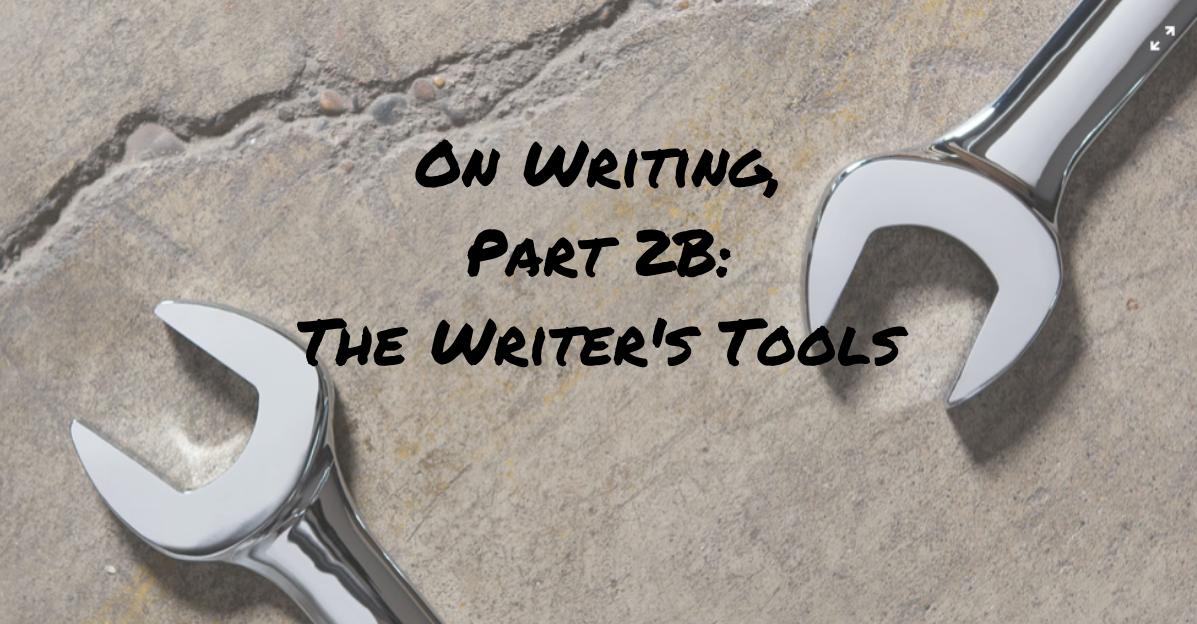Because everyone loves a good story
On Writing, Part 2B: The Writer’s Tools

No matter what or to whom you are writing, clear vocabulary and correct grammar are essential. That’s why they’re on the top shelf of the writer’s toolbox. But even a careful elementary student could accomplish that much. What other tools should a good writer wield?
SECOND SHELF: Elements of Style
Paragraphs
It may seem strange to consider the paragraph as a writing tool, but it really is. “Paragraphs are almost as important for how they look as for what they say; they are maps of intent” (130). Think about perusing a new book. You can pretty much guess if it’s going to be an easy read or a difficult journey based on how packed the pages look, right? Lots of paragraph breaks and dialogue give the page an airy feel like a well-ventilated sitting room with a nice cross breeze. But a paragraph that lasts for two or three pages is like sitting down to a well-done eye of round with naught save a butter knife and some dentures.
Good luck.
That’s not to say long paragraphs are off limits. Just consider your purpose. If you’re writing formal stuff like essays, it’s important to follow a predictable structure (topic sentence, support sentences, conclusion). But if you’re writing fiction, there’s a lot more wiggle room. “When composing [fiction] it’s best not to think too much about where paragraphs begin and end; the trick is to let nature take its course. If you don’t like it later on, fix it then” (132).
Fragments
If you think this section will be an indictment on sentence fragments, think again. There are situations, especially in fiction, where a fragment can “work beautifully to streamline narration, create clear images, and create tension as well as to vary the prose-line” (133). No need to get carried away and use them all the time, but an occasional fragment can really spice things up. Honest.

And if that unorthodox advice rubs you the wrong way, consider King’s next assertion: “Language does not always have to wear a tie and lace-up shoes. The object of fiction isn’t grammatical correctness but to make the reader welcome and then tell a story…to make him/her forget, whenever possible, that he/she is reading a story at all” (134).
Wait, what? Writers are allowed to fudge on grammatical correctness? Isn’t that a violation of last time’s advice to pursue grammatical correctness with assiduous diligence? (Oops. And also to avoid inflated vocabulary.) No. Notice that he says the object or point of fiction isn’t to exemplify perfect grammar. A good author is allowed to break the rules as long as it’s intentional, beneficial, and earned. Accidental, confusing, and gratuitous mistakes are now and always shall be unacceptable. Amen and amen.
THIRD SHELF: Writing Fiction
Once you as a writer have achieved the habits of clear vocabulary, correct grammar, suitable paragraphs, and occasional fragments, pat yourself on the back. You’re way ahead of the curve. Now you can open the third shelf of the writer’s toolbox and begin writing fiction! Huzzah!

If, however, this is not your desire, that’s fine. Just remember that many writers never set out to become published authors; they started by telling stories to their children (Watership Down) or writing books on a dare (Green Eggs and Ham and Frankenstein) or filling in the gaps in modern literature (The Lord of the Rings and The Chronicles of Narnia). I’m just saying you may not plan to open the third shelf any time soon, but don’t throw away the key.
Just remember that it takes commitment to write a whole book, even a short one. And that’s only the first step—publication may take even longer than the writing process. (More on that in later weeks.) But when an author does his or her best, sometimes the magic happens, and the book comes alive for the readers. That’s why even hefty tomes like Tolkien’s trilogy still gets countless reads today. You and I may never achieve that status, but then again we may.
Isn’t it worth a try?
Source:
King, Stephen. On Writing: A Memoir of the Craft. Scribner, 2000.

Add a comment, and join the conversation!